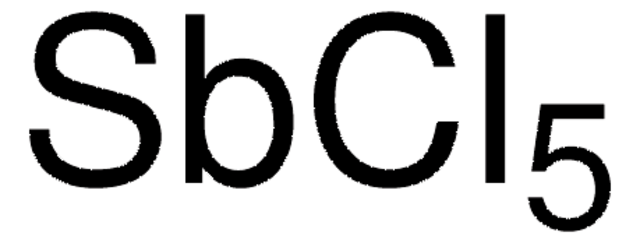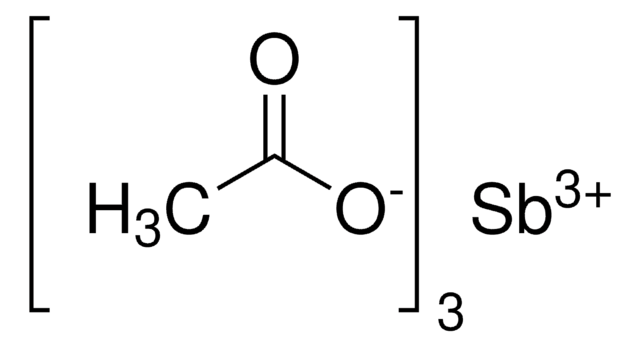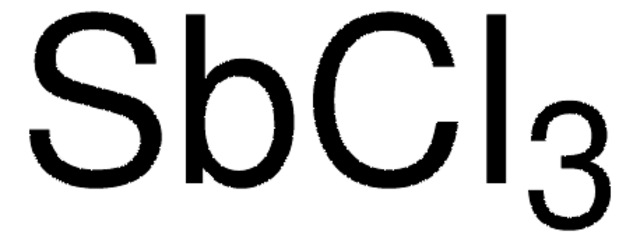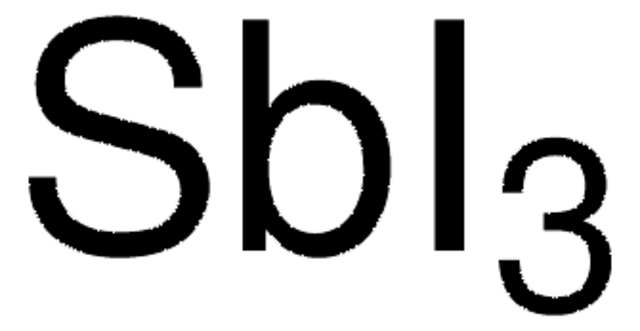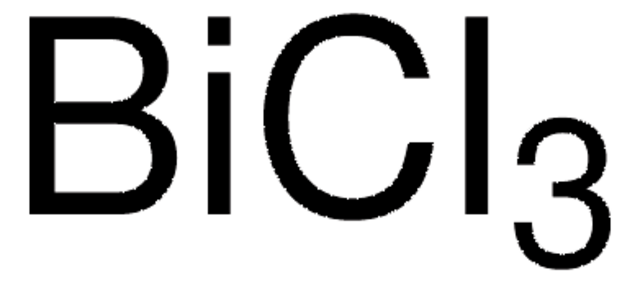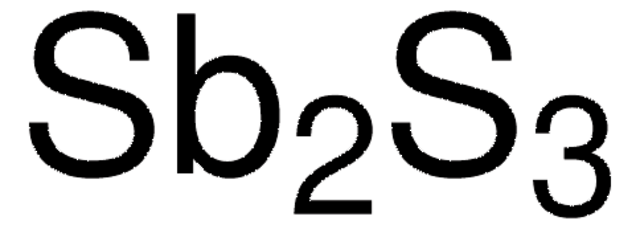337374
Antimony(III) chloride
≥99.95% trace metals basis
Synonym(s):
Antimony trichloride
Sign Into View Organizational & Contract Pricing
All Photos(2)
About This Item
Linear Formula:
SbCl3
CAS Number:
Molecular Weight:
228.12
EC Number:
MDL number:
UNSPSC Code:
12352302
eCl@ss:
38080204
PubChem Substance ID:
NACRES:
NA.23
Recommended Products
vapor density
7.9 (vs air)
Quality Level
vapor pressure
1 mmHg ( 49 °C)
Assay
≥99.95% trace metals basis
form
crystalline
reaction suitability
reagent type: catalyst
core: antimony
impurities
≤500.0 ppm Trace Metal Analysis
mp
73.4 °C (lit.)
SMILES string
Cl[Sb](Cl)Cl
InChI
1S/3ClH.Sb/h3*1H;/q;;;+3/p-3
InChI key
FAPDDOBMIUGHIN-UHFFFAOYSA-K
Looking for similar products? Visit Product Comparison Guide
Application
- Obtaining of nanosized compound Sb2S3: This study focuses on the formation of Sb2S3 nanorods using antimony(III) chloride, relevant for material science applications in semiconductors and sensors (Guseynov et al., 2017).
- Highly Efficient Light‐Emitting Diodes Based on an Organic Antimony (III) Halide Hybrid: This study presents applications in optoelectronics, specifically in the development of efficient light-emitting diodes, of interest to material science chemists (Li et al., 2022).
- Antimony (III) halide compounds of thioureas: Structures and biological activity: This research explores the biological activity of antimony(III) halide complexes, which could be of interest to drug discovery chemists looking for novel therapeutic agents (Hadjikakou et al., 2014).
Signal Word
Danger
Hazard Statements
Precautionary Statements
Hazard Classifications
Aquatic Chronic 2 - Skin Corr. 1B
Storage Class Code
8A - Combustible corrosive hazardous materials
WGK
WGK 2
Flash Point(F)
Not applicable
Flash Point(C)
Not applicable
Personal Protective Equipment
dust mask type N95 (US), Eyeshields, Gloves
Choose from one of the most recent versions:
Already Own This Product?
Find documentation for the products that you have recently purchased in the Document Library.
Customers Also Viewed
Tahani Alqahtani et al.
Scientific reports, 11(1), 1887-1887 (2021-01-23)
We report a simple, economical and low temperature route for phase-pure synthesis of two distinct phases of Cu-Sb-S, chalcostibite (CuSbS2) and tetrahedrite (Cu12Sb4S13) nanostructures. Both compounds were prepared by the decomposition of a mixture of bis(O-ethylxanthato)copper(II) and tris(O-ethylxanthato)antimony(III), without the use
James M Hogg et al.
Dalton transactions (Cambridge, England : 2003), 46(35), 11561-11574 (2017-08-03)
Coordination complexes of Lewis acidic metal chlorides AlCl
T Gebel
Mutation research, 412(3), 213-218 (1998-05-26)
Arsenic and antimony are two semimetals sharing some chemical as well as toxicological properties. Both elements are clastogenic but not point mutagenic in their trivalent state of valency. Environmental exposure to arsenic was proven to be associated with increased rates
[An experimental study on effects of antimony on anti-oxidase system on liver mitochondria in mice].
A Wang et al.
Zhonghua yu fang yi xue za zhi [Chinese journal of preventive medicine], 32(4), 229-230 (1999-05-14)
To explore the mechanisms of toxic liver damage caused by antimony. Experimental mice were injected peritoneally 40 mg/kg of antimony trioxide daily for 28 days to observe the effects of it on the anti-oxidase system in their liver mitochondria. Activities
H Huang et al.
Toxicology, 129(2-3), 113-123 (1998-10-15)
Antimony compounds are widely used in various manufacturing and semiconducting industries. Previously, it has been shown that antimony trichloride (SbCl3) elevates sister chromatid exchange (SCE) rates in V79 cells after a 28-h incubation. However, only limited data on its genotoxic
Our team of scientists has experience in all areas of research including Life Science, Material Science, Chemical Synthesis, Chromatography, Analytical and many others.
Contact Technical Service
